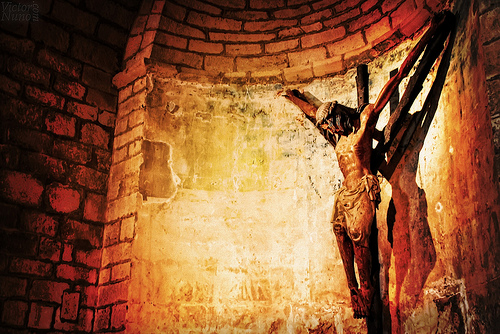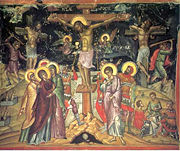Good Friday 2011
If you had been standing at the foot of the cross and saw the man you called “Lord,” the man you believed was the Son of God, crucified and dying, what would you think those words meant?
If all of your hopes and dreams were pinned on this one man, the one you had followed throughout Palestine, the one you listened to so closely, the one you watched cure the sick and raise the dead … what would you think those words – “It is finished” – meant?
Would all your dreams be dying up on that cross with him? Would all your hopes die up there as well?
Mary stood at the foot of the cross – Mary, Jesus’ mother. Surely she thought this was the end of all her hopes and dreams, watching her child die.
Mary the wife of Clopas and Mary Magdalene stood there. Surely they heard those words and thought, “It’s over.”
The beloved disciple stood there. He must have thought, with great heartbreak, “We were wrong.”
What would you have thought, if you had been at the foot of the cross that day 2,000 years ago, outside the gates of Jerusalem, when you heard Jesus say, “It is finished”?
(sing)
Were you there when they crucified my Lord?
Were you there when they crucified my Lord?
Oh, sometimes it causes me to tremble, tremble, tremble.
Were you there when they crucified my Lord?
My brothers and sisters in Christ, on this Good Friday, 2,000 years after that day when Jesus died, we are standing at the foot of the cross.
I want you to pay no attention to the fact that we already know (or, we think we know) the rest of the story. Forget about Easter morning for a moment, and concentrate on what it is like to stand at the foot of the cross.
Stand there … with Mary, the mother of Jesus, and Mary, the wife of Clopas, and Mary Magdalene, and the Beloved Disciple …
Stand right next to them …
And think about what Jesus meant when he said, “It is finished.”
(sing)
Were you there when they nailed him to the tree?
Were you there when they nailed him to the tree?
Oh, sometimes it causes me to tremble, tremble, tremble.
Were you there when they nailed him to the tree?
As you stand there, with all your hopes and dreams dying, remember:
This is John’s Gospel.
This is the way John tells the story.
Which means …
Which means …
There’s a different take that we have to examine on this particular Good Friday.
In Matthew’s and Mark’s Gospels, we hear the wounded and suffering Jesus call out, “Eloi! Eloi! Lema sabachthani?” “My God! My God! Why have you forsaken me?”
In Luke’s Gospel, Jesus promises paradise to the thief crucified with him, and then cries out in a loud voice, “Father, into your hands I commend my spirit!”
But in John’s Gospel, Jesus simply says, “It is finished.”
This is no sigh of defeat. This is not a cry of despair.
This is Jesus as John saw him, Jesus a man on a mission from God, a man who knew, from the beginning, exactly who he was, and what he was doing, and why he was doing it.
In John’s Gospel, we see a triumphant Jesus hanging on the cross, doing exactly what he was called to do, clear-minded, with a single, driving vision of which he never lost sight, from which he never wavered.[1]
Nowhere in this Gospel do we hear any pleas for release, any prayers to “remove this cup.” Nowhere does Jesus doubt that this moment on the cross is exactly what God planned, exactly what he was supposed to be doing.
John’s telling of the arrest, torture and crucifixion of Jesus is confident … vibrant … even a bit sassy.
Remember, at the Last Supper, he said, “One of you will betray me.”
At the Garden where they came to arrest him, he identified himself as “I AM,” taking for himself the name of God.
Standing before the high priest and Pilate, he practically taunted them: “You say that I am.”
He gets no help carrying the cross to Golgotha.
On the cross itself, he takes care of last things: To his mother, he says, “Woman, this is your son.” To his disciple, he directs: “This is your
mother.”
After that, knowing that it was finished, he said, “I thirst” – in order to fulfill the Scripture.
He sucked the wine out of the sponge, then proclaimed, “It is finished.”
And then he bowed his head and breathed his last.
Do you hear anything of defeat here?
Any doubt?
Any hesitation?
No!
Because this is John’s Gospel, and in John’s Gospel, Jesus knows exactly what he is doing, every step of the way, every moment of the day.
“It is finished” is not a plea of defeat.
It’s Jesus cry of triumph!
(sing)
Were you there when they pierced him in the side?
Were you there when they pierced him in the side?
Oh, sometimes it causes me to tremble, tremble, tremble.
Were you there when they pierced him in the side?
Now … understanding that in John’s Gospel, Jesus is a determined man on a mission from God … standing there at the foot of the cross with the women and the Beloved Disciple … now tell me, what exactly do you think Jesus meant when he said, “It is finished”?
Yes, Jesus died a terrible, painful, brutal, humiliating death. Do not lose sight of that.
But Jesus didn’t look at it that way – not in John’s Gospel.
For Jesus, “It is finished” is a statement of glory.[2]
As commentator David Lose writes,
“The great irony of John’s passion is that in Jesus we see God’s strength, majesty and might revealed amid the pain and humiliation of crucifixion. … John’s depiction of the Passion of our Lord reminds us that, ultimately, Jesus is Lord. Through him, God overcomes any and all obstacles – including death – in order to redeem and restore us.”[3]
Which means that when we hear Jesus say, “It is finished,” what he’s telling us, from that pain-filled place on the cross, is that his job is over.
He has shown us how to live – in love.
And he has given us a vision – the vision – on which we are called to focus, every moment of our lives.
Everything Jesus did, everything he said, everything he taught, every miracle he performed and prayer he prayed was done in the sure and certain knowledge that this is what God wanted done.
Just as Jesus never wavered, so we are not to waver.
(sing)
Were you there when they laid him in the tomb?
Were you there when they laid him in the tomb?
Oh, sometimes it causes me to tremble, tremble, tremble.
Were you there when they laid him in the tomb?
Yes, we are called to witness the crucifixion this day, to wonder and cry.
And we should be filled with trembling. We should be trembling all over!
Because Jesus just turned the whole job over to us! He’s given us the whole shebang!
Everything he did? All that preaching and teaching and healing and bringing back to life?
He’s done with that.
Now it’s our turn.
Yes, we should be trembling right about now, because now …
… Now we are the ones who have to do what he did, we are the ones who have to take up our own crosses, we are the ones who have to die to all the things that get in the way of our lives in God!
Now we have to preach the Gospel, the Good News of God in Christ Jesus!
Now we have to teach the world how to live in unity and peace, instead of discord and war!
Now we have to heal the sick and bring life – new life – to all those who live in death! We are the ones who are to give hope to the hopeless, who are to love the unloved, who are to fulfill the dream of God.
So yes, we should be trembling right now, because Jesus just put all his work on our shoulders and in our hearts. And that frightening thought should make us tremble!
Robert Fulgham once famously said, “All I really needed to know I learned in kindergarten,” and in many ways, that is true.
But the reality is, everything we really need to know? We learned it all from Jesus.
That’s why Jesus was so triumphant on the cross.
That’s why Jesus said, “It is finished.”
Because his part – his earthly part of teaching us, of training us, of inspiring us? That’s done.
Jesus had a job to do and he did it.
Now, he’s given the job to us – and trusting us to do it.
So, yeah, we should be trembling – heck, we should be quaking in our boots right about now!
Because we have no more excuses.
Jesus was a man on a mission from God, and he wants us to go on that mission as well.
“It is finished”?
It means that from now on, we have to do the work that Jesus did, because Jesus has called us, because Jesus trusts us, because Jesus is counting on … us.
We are on a mission from God, my friends.
It’s not Jesus’ job any more. His part? It is finished. Over with. Done. Fini.
Now? Now it’s all up to us.
Amen.
Sermon for Good Friday, 22 April 2011, Year A, Trinity Episcopal Church, Arlington, Va.
[1] Professor David Lose, Marbury E. Anderson Biblical Preaching Chair, Luther Seminary, St. Paul, Minn., “Commentary on the Gospel,” Good Friday, 22 April 2011,







